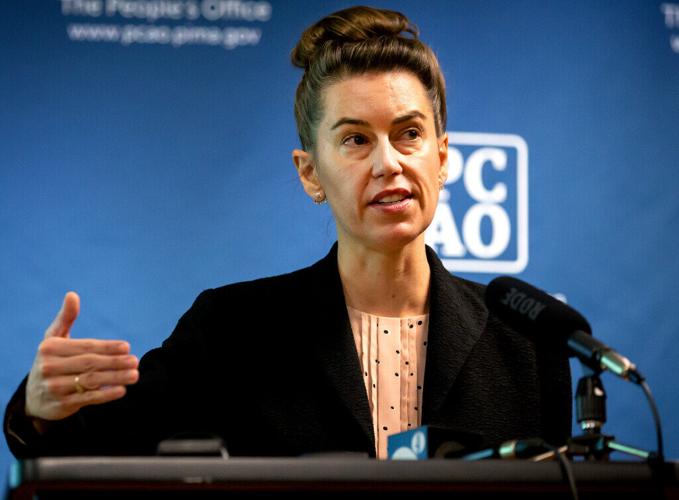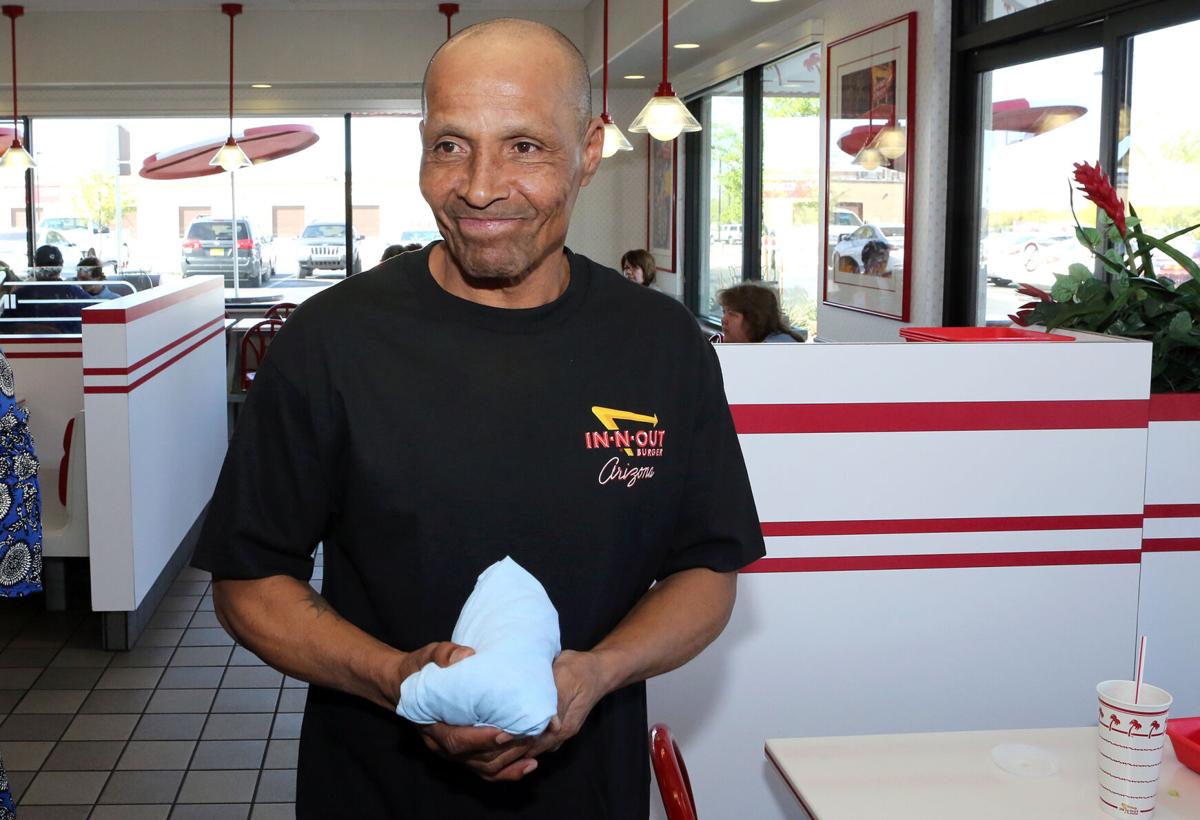Pima County Attorney Laura Conover will not drop criminal charges against Louis Taylor for his conviction in the 1970 Pioneer Hotel fire after her office “did not find any new evidence of innocence,” she announced Wednesday.
The move is a reversal of Conover’s previous considerations to vacate Taylor’s conviction and came the day after the county’s Board of Supervisors held an hour-long executive session discussing the case behind closed doors.
The office’s Conviction and Sentencing Integrity Unit has completed its review of the case, according to a news release from Conover, who said, “I have concluded that where the criminal case is concerned, I have met my ethical obligations as a prosecutor.”
Taylor served 42 years in prison after being convicted of starting the fire that killed 29 people in 1970. In 2013, he made a plea deal with then-county attorney Barbara LaWall’s office that set aside the conviction and released him from prison with time served.
At the time, LaWall insisted the move was not an exoneration. Taylor has continued to maintain his innocence.
Taylor sued Pima County and the city of Tucson in 2015 for violating his right to due process and a fair trial, alleging racism and civil conspiracy led to his arrest and conviction. The amount of compensation he is seeking is undisclosed.
The 9th Circuit Court of Appeals ruled in 2019, however, that Taylor could not collect damages for his time in prison because of the no-contest plea he made. Taylor’s lawyers have said new evidence, and evidence left out of the time of Taylor’s criminal case, permits a new hearing.
The Arizona Justice Project, which worked on Taylor’s case for more than 20 years, said in a news release Thursday, “The Pima County Attorney has foregone a critical opportunity to correct one of the most severe injustices Pima County has ever seen.”
The release states the county attorney’s office was “on the verge” of concluding Taylor was wrongly convicted, but “for reasons never explained,” never did so.

Pima County Attorney Laura Conover has announced she will not vacate the charges of Louis Taylor for the 1970 Pioneer Hotel Fire despite previous considerations to do so. Conover denies she has a conflict of interest in the case.
“Since Taylor’s 1972 conviction, critical witnesses have recanted and numerous instances of intentional prosecutorial misconduct have surfaced — including hiding exculpatory evidence from the defense, extracting false testimony from juveniles threatened with incarceration, and secretly speaking with a dismissed juror mid-trial to get a handle on the jury’s leanings,” the release said. “The case was suffused from the outset with intent to blame the ‘Negro’ or ‘Colored boy.’”
During Taylor’s trial, then-Tucson Fire Department investigator Cy Holmes said he believed the fire was set intentionally by a black teenager and that “Blacks at that point, their background was to use fire for beneficial purposes.” Taylor, who is Black, was 16 at the time of the fire.
In a news release sent out Thursday, Taylor’s attorneys also expressed dismay with the decision and said Taylor “remains confident that justice will be served.”
“Ms. Conover holds herself out as a prosecuting attorney willing to correct the injustices of the past. Her decision in this case belies that and shows she is more interested in protecting the County from financial exposure resulting from her predecessors’ misconduct,” the release said.
Taylor’s attorneys have argued throughout the civil case that the dismissal of the 2013 convictions would permit him to receive damages from the time he spent in prison. Now, Conover’s decision won’t give Taylor that leg up in the case.
Conover denies conflict of interest
Before Conover took office in 2021, LaWall’s team hired outside counsel to take over the Taylor civil lawsuit after finding her prosecution of the case would pose a conflict of interest.
The basis of the conflict, they said, was that Conover conducted research for one of Taylor’s parole hearings while she was in law school and discussed her dismay with how the Taylor case was handled throughout her campaign for county attorney.
Conover has said she never worked on Taylor’s case and that she didn’t know outside counsel had been hired until January, after she had already directed senior counsel in her staff to discuss settlement options in the Taylor civil case.
Conover said in a news release Wednesday: “I have never represented or participated in the representation of Mr. Taylor, whether in law school 20 years ago or since” and that “The prior administration’s conclusions were wrong, but rather than disrupt the defense of the County in the civil lawsuit, I chose not to contest their decision after I took office.”
However, Conover’s Facebook page shows she replied to a comment in January 2020 asking if she had met Louis Taylor, and said: “During law school I was able to provide a little research to prepare for one parole hearing, but it was sadly minimal as I was only a student. I felt powerless to help. That feeling has stayed with me. I still pray for Louis.”

While campaigning for county attorney in January 2020, Laura Conover commented on her Facebook page that she has met Louis Taylor and "was able to provide a little research to prepare for one parole hearing." Conover has denied ever working on Taylor's case, but her involvement led the previous county attorney to determine she had a conflict of interest in it.
In another Facebook comment, Conover said: “He should have been compensated, in my humble opinion. The case caused outrage in me at an early age and has stayed with me.”
When asked to comment further on the matter, C.T. Revere, the county attorney’s office’s director of communications, said in an email: “We are going to let the statement stand and not do any interviews on the final decision in this review.”
While Conover has maintained she wasn’t aware of the conflict of interest finding from her predecessor’s office, a Sept. 28 email between Conover and then-Chief Ethics Counsel Regina Nassen shows the county attorney was informed the Taylor case was sent to outside counsel.
Regardless, Conover told Nassen in an email she was “left completely in the dark” about her removal from the case when asked about sending counsel to mediate with Taylor’s attorneys.
Both Nassen and former Chief Civil Deputy Andrew Flagg resigned from the office over Conover’s actions in the Taylor case.
“You will separately receive my resignation letter, but your decision to blame Regina for this situation is unfair, greatly disappointing, and requires its own response,” Flagg wrote in an email to Conover in February 2021. Flagg added later, “At a minimum, I would expect that you could understand, from the client’s perspective, why the election of a new county attorney who publicly espoused those views could cause a lack of harmony in the representation.”
Photos of the 1970 Pioneer Hotel fire in downtown Tucson

The Pioneer Hotel never recovered from the 1970 fire, said Bettina Lyons, niece of the couple who owned the hotel. "Even though they put money into it and put sprinkler systems in, people did not come to stay."

Victims are removed from the front entrance to the Pioneer Hotel in Dec. 1970.

A injured firefighter is wheeled to an ambulance at the Pioneer Hotel fire on Dec. 20, 1970.

In the end, the Pioneer Hotel fire killed 29 people, some of them jumping from windows to escape the flames. Louis Taylor was convicted of arson. The first articles ran in the Star Dec. 20, 1970.

The Pioneer Hotel in 1961.

Firefighters on an old Tucson Fire ladder truck help a woman down from the upper floors during the Pioneer Hotel fire on Dec. 20, 1970.

A firefighter sprays water on windows of the upper floors of the Pioneer Hotel fire on Dec. 20, 1970.

A man stands at the window on one of the upper floors of the Pioneer Hotel fire on Dec. 20, 1970, as the fire rages above.

A firefighter helps an unidentified man after plucking him from a room near the top of the Pioneer International Hotel which caught fire early in Dec. 1970.

Tucson firefighers apply a steady stream of water during the Pioneer Hotel fire in Dec. 1970. Tucson's firefighting equipment was ruled inadequate following this fire when they were unable to aid many trapped on the higher floors.

Flames and smoke shoot from the windows in the upper floors during the Pioneer Hotel fire in Dec. 1970.

Flames and smoke shoot from the windows in the upper floors as firefighters extend the ladder to save those below during the Pioneer Hotel fire in Dec. 1970.

Victims are removed from the front entrance to the Pioneer Hotel in Dec. 1970.

Victims are removed from the front the entrance to the Pioneer Hotel in Dec. 1970.


Smoke billows from the upper floor of the Pioneer International Hotel as three firemen work to rescue survivors of the early-morning blaze. The firemen at the bottom is helping an elderly Pioneer tenant to walk down the ladder.

Fireman help the injured at the Pioneer Hotel blaze in Dec. 1970.

A hotel patron is helped down the ladder to safety during the Pioneer Hotel Fire in Dec. 1970.

Pioneer Hotel Fire

Tucson firefighters climb a ladder at the Pioneer Hotel Fire in 1970. Courtesy of Tucson Fire Department

Tucson firefighters help an elderly patron down the ladder at the Pioneer Hotel fire in Tucson on Dec. 20, 1970.

G.L. Scoggins, catering manager, talks to exhausted Tucson firefighers at the Pioneer Hotel fire in Tucson on Dec. 20, 1970.

An exhausted Tucson firefighter at the Pioneer Hotel fire in Tucson on Dec. 20, 1970.

People draped in blankets outside the Pioneer Hotel in Tucson after a fatal fire on Dec. 20, 1970.

People in downtown Tucson gaze up at the Pioneer Hotel the morning after the deadly fire in Dec. 1970.

People in downtown Tucson gaze up at the Pioneer Hotel the morning after the deadly fire in Dec. 1970.

Aftermath of the Pioneer Hotel Fire in Dec. 1970.

The aftermath of the Pioneer Hotel Fire in Dec. 1970.

The bedroom suite at the Pioneer Hotel kept by the Steinfelds, owners of Steinfelds Department Store. The couple died in the massive hotel fire on Dec. 20, 1970.

Aftermath of the Pioneer Hotel in Dec. 1970.

Funeral of victims of the Pioneer Hotel Fire in Dec. 1970.

Louis Taylor in 1970. Taylor was tried and convicted of 28 counts of felony murder in connection with the fire at the Pioneer Hotel, Tucson.

Arizona prison inmate Louis C. Taylor, serving a life sentence after being convicted in the deaths of 28 people in the 1970 Pioneer Hotel fire. A 29th person died later of injuries from the fire.

Louis Taylor shakes the hand of his first attorney from 1972, Howard Kashman, back to camera, as his current defense team from Phoenix surrounds him after a hearing in Pima County Superior Court in Tucson, Ariz. on Tuesday April 2, 2013. Taylor, who was originally convicted of 28 counts of felony murder in connection with the fire, was released from prison after 42 years.







